By Fazli Hajrizi
The first part
Memorie.al / Rexhep Mitrovica, is a major, complex and dramatic figure, a fighter from the first hours for the creation of ethnic Albania, an outstanding and special personality of the fight for freedom, democracy and national unity, a true intellectual, leader and educator, participant in the Assembly of Vlora on November 28, 1912, in the act of the Declaration of Independence of Albania, deputy of Peja and Gjakova in the Albanian Parliament, Minister of Education (1922-1924), reformer of national education, chairman of the organization “Lidhja Albanian People” based in Mitrovica, chairman of the Central Committee of the Second League of Prizren, and Prime Minister of Albania.
Historical literature during the period of more than 50 years dedicated this calm and cultured, wise, taciturn and soft-spoken man, with pure justice, who dedicated his enlightened mind and fiery heart, his sanctified word and his immortal work to the homeland of the nation, gave it unilaterally, calling him: “collaborator of Nazism, traitor, drunkard, and tuberculosis” and his collaborationist government.
He, along with other nationalists from Kosovo, such as: Xhafer Deva, Bedri Gjinaj, Dr. Xhelal Mitrovica, Bedri Pejani, Selman Riza, Ahmet Gashi, Ymer Berisha, Shefqet Shkupi, Luan Gashi, Rexhep Krasniqi, Tahir Zajmi and many others, gave an outstanding help in keeping Albanian nationalism, culture, education and resistance alive national.
Organizer for the expulsion of Turks from Albania
Taking advantage of the Young Turk Revolution, after July 20, 1908, i.e., after the proclamation of the Constitution, Albanian language schools were opened, such as in Elbasan, Filat, Frashër, etc. By opening schools, writing books in the Albanian language, only with the Latin alphabet, it was intended to keep our people united regardless of religion, region, etc. Beginning after the Congress of Bitola (November 14-22, 1908), where the Alphabet, this sacred book of patriotism, was approved, Rexhep Mitrovica, together with Sali Gjuka, started working on teaching Albanian schools with this alphabet.
The books, which were published in the Latin alphabet, approved at the Monastery Congress, passed from hand to hand. Albanian MPs like; Hasan Prishtina, Ismail Qemali, Shahin Kolonja, Nexhip Draga and some others were active in the Turkish parliament in Istanbul and in various centers. Rexhep Mitrovica, was familiar with their activity, as well as with the open reactionary actions of the Young Turks, who mercilessly and insidiously attacked clubs, national schools, patriots and the national movement, which was massovized in all Albanian provinces.
He made contact with patriotic circles and secret committees, for the organization of armed uprisings against the Ottoman regime. The attack of the Albanian fighters from the district of Mitrovica, Vushtrri and Podujeva, at the beginning of April 1910, against the Turkish garrison in Pristina, was preceded by the blood reconciliation action. Rexhep Mitrovica supported this blood reconciliation action and armed uprising with his whole being.
At the same time, he expressed the necessity of a general uprising, supported the Gërça Memorandum, approved on June 23, 1911, in Malesia e Madhe, its 12 points presented by the Assembly that were sent to the High Gate, such as: recognition of the Albanian nation, unification of the Albanian villages, the establishment of an administration with Albanian officials, the complete freedom of learning the Albanian language and the opening of national schools.
The Memorandum of Gërça lifted the spirits and hearts of the patriots, putting an end to the waiting attitude of some committees in other provinces and, in the political plane of the years 1912-1913, it led to the realization of the demands of the Albanians, to the creation of an autonomous province Albanian.
Among the first, who signed the petition for autonomy addressed to the prefect of Mitrovica, is precisely Rexhep Mitrovica, who propagated the idea that; to ensure Albania’s autonomy, the national movement must turn into a general uprising. Rexhep Mitrovica expressed the necessity of forming a leading leadership for the national movement, because, according to him, it lacked the necessary direction and organization.
In the open sea full of waves, the ship without a helmsman can quickly sink. Even in these turbulent times, the Albanian people need resourceful leaders who will guide them towards their goals. According to him, the internal factor is always compelling, but first, an external ally must be secured. In his consciousness, the thought was deeply embedded, that independence is the only alternative for the protection of the being and the national trunk.
The struggle for independence
Mitrovica, joined Hasan Prishina, Mehmet Pashë Deralla, Ali Riza Kosovo, devising a series of battles against Turkey and leading to the glorious November of 1912. After the Assembly of Junik (May 12, 1912), the uprising began to spread rapidly from Mitrovica , to Preveza. The name of Rexhep Mitrovica became known throughout Kosovo for his indomitable spirit, loyalty and devotion to the nationalist sentiment.
The general uprising of 1912, for known reasons, ended without fully achieving the set objectives. Serbian forces invaded Kosovo and advanced towards Elbasan and Durrës, to reach the sea. The declaration of independence had become necessary, so salvation in independence was the fairest solution with this major act, the independence of Albania, its national and state existence, would be a fait accompli, before the Great Powers and the Balkan states.
From Skopje and Mitrovica, to Durrës and Vlora
Independence was sought by the Albanians of all provinces, from Mitrovica and Prishtina, Shkodra and Skopje, Tetova and Ulqini to Gjirokastra, Preveza and Janina. Thus, on October 14, 1912, in Skopje, which was the capital of the province of Kosovo, Albanian patriots organized a meeting, where they decided to hold a national assembly, which would take decisions on the fate of the endangered homeland. Rexhep Mitrovica, Mit´hat Frashëri, Bedri Pejani, Sali Xhuka, etc. participated in this assembly. According to the decisions of the Skopje Assembly, in the entire Albanian space, the election of delegates to the National Assembly began.
Hasan Prishtina, thought that the act of independence of Albania should be done in Prizren. On October 16, Rexhep Mitrovica, Sali Xhuka, Bedri Pejani and Mit´hat Frashëri, left by train for Mitrovica, where at that time the distribution of weapons had begun. From Mitrovica to Peja, they traveled in a covered wagon. After Peja, where they stayed for several days, they visited Gjakova, one of the most important centers of Kosovo. There they meet Isa Boletini. From Gjakova, they pass through the Prush Pass. In the village of Arnë, they meet Ramadan Zaskoci. They spend a few days in Reç, Mirdita, at the tower of Oroshi, where they meet Monsignor Preng Doçin, an active participant of the League of Prizren, founder of the “Bashkimi” literary society in Shkodër.
They go down to the Fan Valley, to Rubik, then to Tirana and Durrës, where the pariah raised his voice, about the danger of breaking up Albania. Since Durrës was uncertain about the assembly, Elbasan was determined. On November 21, 1912, Rexhep Mitrovica, together with Mit’hat Frashëri, Sali Xhuka and Bedri Pejani, arrived in Elbasan, expressing their conviction that this city is more suitable for this major event.
Since Prizren and Elbasan were endangered by the Serbian invaders, and Durrës was not found suitable either, the delegates left for Vlora. Rexhep Mitrovica, ordered his compatriots to stay with all the barbarism of the skis and unite with all the hostilities and divisions that they and their tools planted.
Vlora was designated for the assembly because it presented a safer and more convenient place to correspond with Europe. Passing through Myzeqe, then going down to Ardenica, they met the caravan of horsemen, coming from Durres, with the delegates of Bucharest, Durres, Tirana, Kavaja, etc., headed by Ismail Qemalin.
After a few days, delegates from Berat, Janina, Gjirokastra, Çameria, etc. also arrived in Vlora. With the initiative of Ismail Qemali and other patriots, on November 28, the Assembly of Vlora was called to declare the Independence of Albania and to form its Provisional Government.
How did they raise the flag in Vlora?
Kosovo, being occupied by the Serbs, was represented in the Assembly of Vlora by Rexhep Mitrovica, Sali Gjuka and Bedri Pejani, delegates from Gjakova, Peja and Gucia. A day later, Isa Boletini, Mehmet Pashë Deralla, Hasan Hysen Budakova, Tafil Boletini, Dervish Mitrovica, Zejnel Begolli, Halim Musë Bajgora, Ahmet Ali Llapi, Riza Beg Gjakova, Vehbi Dibra, Hajdin Draga, etc. arrived at the Assembly who were received with great joy by the population and the delegates of the assembly. The delegates signed the historic act of this culminating event. Among the signatories were Rexhep Mitrovica, Mit’hat Frashëri, Bedri Pejani and Sali Gjuka, who came from Skopje to Vlora together.
Even today, it is difficult to imagine the journey of more than ten days on foot, through mountains and difficult goats, through which these patriots passed to reach Vlora! The Serbs had set up many traps and ambushes. The ardent nationalist Ferid Vokopola, in his memoirs about those difficult days, in the newspaper “Prilindja e Shqypnijes”, (year II, no. 6-7 of January 30 and February 1, 1914), writes: “It comes my friend, the late Nebi Sefa, before leaving for Kavaje, informs me that the Ottoman Command has imprisoned the delegates from Kosovo, Messrs. Bedri Pejani and Rexhep Mitrovica, in the hotel of Shaqir Bey. We immediately talked with our friends and took our way, me, Nebi Sefa and Taulla Sinani, with a patrol of five people, to release them…”!
The Declaration of Independence document was published by the newspaper “Perlindja e Shqypnijes”, an organ of the Provisional Government of Vlora, as well as later by Lef Nosi, in the compilation of historical documents, but the communist regime of Enver Hoxha forged these and many documents. others, thus covering the names of Rexhep Mitrovica, Mit’hat Frashër, Lef Nosi, etc., not only from the relevant document, but also from history. The name of Rexhep Mitrovica was erased from the most important events of 1908-1912, as well as from the later ones, because it did not suit the communist regime that he appeared as the protagonist of the Congress of Manastir, the Assembly of Vlora, etc.
Both in this newspaper and in this issue, it is written how at the opening of the Great Assembly of Vlora, in front of the delegates and men from all ethnic areas, after the verification of the mandate, the respected Rexhep Mitrovica also spoke: “How did finished these works, Mr. Rexhep Beu took the floor and said that Ismail Qemal Beu should be elected as the chairman of the assembly, Luigj Gurakuqi as the first letter, and Luigj Gurakuqi as the second letter, Mr. Shefqet Bey Daiu.
The delegates liked this research and the proposed ones clapped their hands.” This patriot came to Ismail Qemali’s heart. He took him close because he respected his intelligence. Rexhepi, 24 years old, explained to him about the situation in Kosovo, speaking with longing for Mitrovica, his hometown.
In the gatherings and protests that were organized to oppose the hegemonic policy of the Serbs, Greeks and Montenegrins, the genocidal acts of the Serbs in Kosovo, and the Greeks in the south of Albania, he raised his voice strongly, exposing the discriminatory policy even on the pages of the European press time. He lined up in the first ranks of the fighters who fought for the Albanian ethnicity.
During his stay in Vlora, apart from Ismail Qemali, Isa Boletini, Luigj Gurakuqi, Mit’hat Frashëri, Bedri Pejani, Sali Gjuka, he got to know and made friends, so to speak, with all the personalities of those events and days of the declaration of independence, how with; Dom Nikollë Kaçorin, vice president, Mehmet Pashë Deralla, Minister of War, Petro Pogën, Minister of Justice, Myfit Bey Libohovën, Minister of Internal Affairs, Abdi Bey Toptanin, Minister of Finance, Pandeli Calën, Lef Nosin, Riza Bey Jakovën, Syrja Vrijon, Musa Hekal, Alem Tragjas, Mehmet Radhima, Qazim Kokoshin, Ahmet Mersini, Cano Sharra, etc…!
Who was Rexhep Mitrovica?
Rexhep Mitrovica was born in 1888, in the city by the Bardhë River, in a patriotic family. It saw the light of life at the time when the Albanian League was extinguished in blood, when the decisions of the Berlin Treaty were being implemented to the detriment of the Albanians, at the time when the wounds of the emigrants who came from the districts of Leskoci, Nis, etc., were draining pain, their confessions shook stone and wood.
He came to this world, at the time when the echo of the Albanian League of Prizren, had spread to Mitrovica and as a primary goal, he had the freedom and independence of the Albanian lands. He spent his childhood in his native country. He received religious lessons and basic knowledge in the Turkish language; although a pure and beautiful Albanian language was spoken in Mitrovica. As a smart child, he carefully listened to the conversations of his friends, which revolved around Albania, its fate.
They left their mark on the soul and quiet temperament of the dreamy-eyed boy. Wherever the waves of life took him, in his heart and mind, he kept the city beautiful and clean. He often wrote longingly about it, about the river, about the magnificent castle, about the golden Trepca, he told with pride about the brave warriors, and the fiery Albanian race, which lived on the northern border of ethnic Albania.
At that time in Mitrovica, the branch of the League Committee operated which governed the country and organized armed wars to create a united Albania. The armed forces of the League had liberated Mitrovica on January 25, 1881. This detail was proudly mentioned by the residents of this area. Rexhep Mitrovica, who was a careful observer, recorded everything in his extraordinary memory. He was distinguished by a great desire to learn. After his studies in his hometown, he made his way to Skopje, to this important patriotic center.
He enrolled in high school. He took the name of his hometown as his last name. He was one of the most diligent and talented students. Serious studious as he was, he immediately attracted the attention of teachers, who saw in him the hope of the homeland, and of his friends, who saw in their peer a loyal and sincere friend. He studied with great zeal, being thus convinced that the homeland, at the beginning of the new century, is in great need of the pen and knowledge, which would one day precede the echo of the weapons of freedom.
As a high school student, he studied several disciplines: history, geography, mathematics, learning foreign languages, etc. He read artistic literature, especially classical and contemporary authors. He read the works of the Renaissance with passion. He set out in search of himself, in search of discovering the role that fate had assigned him. Books, for which he had a special passion, became his best friends.
As a high school student, under the influence of our revivalists, he started his own work in the direction of increasing national consciousness. Although still young, he became known and respected even in intellectual circles. He got acquainted with the writings of Mit’hat Frashër, which he liked very much.
His views that; only with knowledge, we can do great things, that Albanians, as much as they need bread, need knowledge and nationalism, that in order to survive as a nation, we must fight to become and be known as a nation, etc. ., he supported them with his whole being. Together with Bedri Pejani and Sali Gjuka, in 1908, he led a propaganda campaign in preparation for the Congress of Manastir.
He did not call the historical gathering of Manastir just a gathering of linguists, but a national Congress on the most important issue of our movement. A high level of national awareness was achieved, the unity of the Abes, they testified to the world about the existence of the Albanian nation, which, although bound, saw its perspective only towards the west.
He saw the awareness and unity of Albanians as the only hope in the face of danger. In Rexhep Mitrovica, the idea of freedom that was treated in a general way by our renaissance receives a concrete and contemporary treatment. He is against primitive freedom with a rifle in hand and death in his teeth, which is wild and painful, dangerous, but for a freedom that has tremendous spaces and opportunities.
In the first decade of the 20th century in Skopje, in Manastir and in other cities, the national movement became very lively and was marking a high level of development. Societies, cultural clubs were founded, which turned into centers for the organization and direction of the national movement. Memorie.al
The next issue follows




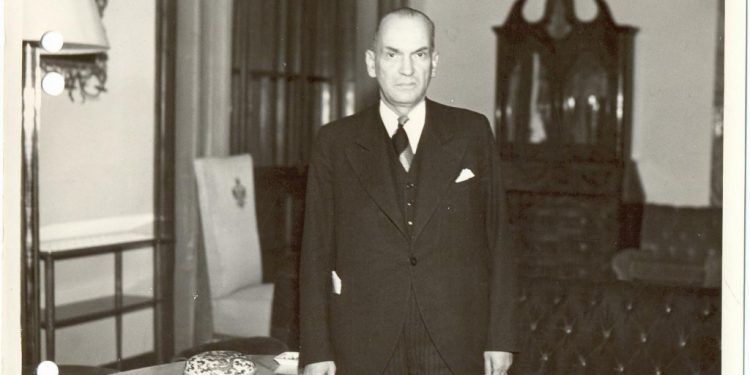
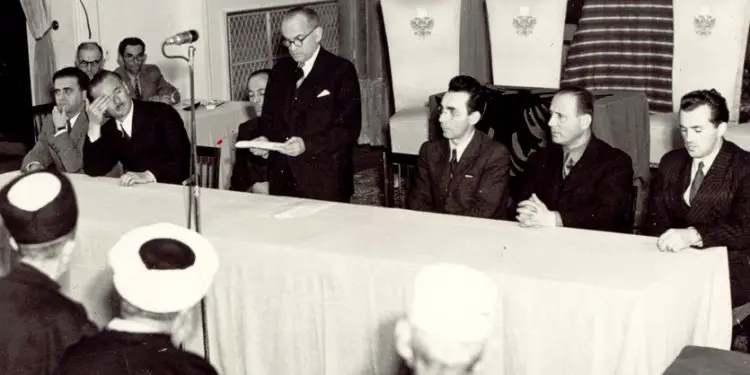
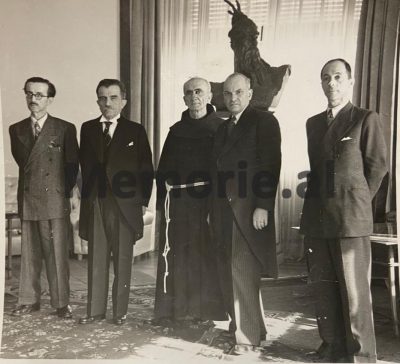
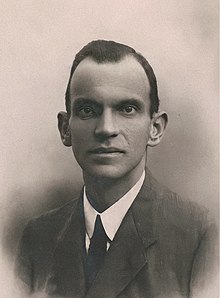
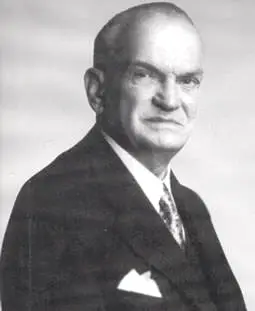
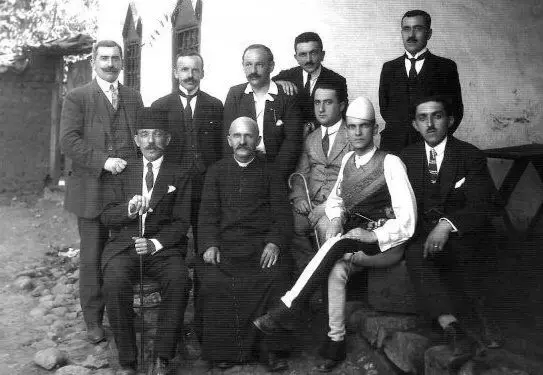




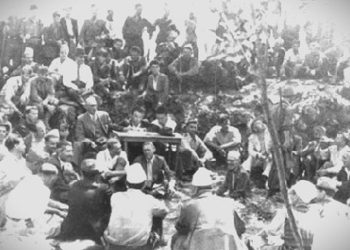
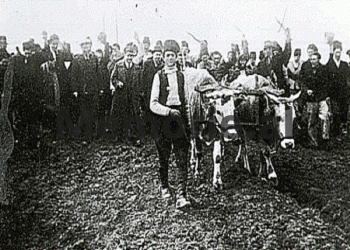
![“They have given her [the permission], but if possible, they should revoke it, as I believe it shouldn’t have been granted. I don’t know what she’s up to now…” / Enver Hoxha’s letter uncovered regarding a martyr’s mother seeking to visit Turkey.](https://memorie.al/wp-content/uploads/2026/01/Dok-1-350x250.jpg)
